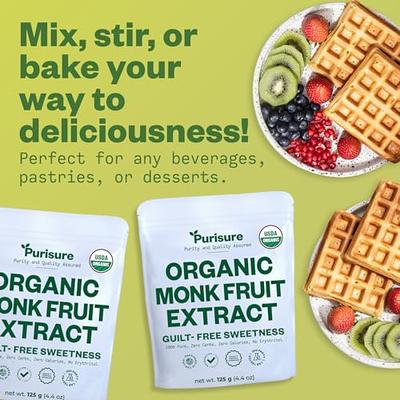Contents
Table of Contents
- Introduction
- What Is Monk Fruit?
- Why Monk Fruit Without Erythritol?
- Health Benefits of Monk Fruit Without Erythritol
- How to Use Monk Fruit Without Erythritol
- Popular Brands Offering Monk Fruit Without Erythritol
- Conclusion
- FAQs
Introduction
When it comes to sweeteners, the options seem endless—especially for those trying to reduce sugar intake or follow a keto-friendly diet. Monk fruit is one of the most popular natural alternatives to sugar, but many products include erythritol, which can be a dealbreaker for some. So, what’s the deal with monk fruit without erythritol? Is it just as sweet and effective? Let’s dive in to explore all the details about this sweet little fruit and why you might want to choose it without erythritol.
What Is Monk Fruit?
Monk fruit, also known as Luo Han Guo, is a small green melon that originates from Southeast Asia. It’s naturally sweet but contains no calories, making it an excellent sugar substitute for people looking to cut back on sugar or avoid artificial sweeteners. The sweetness comes from antioxidants called mogrosides, which are extracted from the fruit. Unlike sugar, monk fruit does not spike blood sugar levels, making it a go-to for diabetics and those on a low-carb diet.
However, many monk fruit products you’ll find on the market come mixed with erythritol, a sugar alcohol, to reduce the intense sweetness. While this combination works for some, it may cause digestive issues for others. That’s where monk fruit without erythritol comes into play.
Why MonkFruit Without Erythritol?
You might wonder why anyone would want monk fruit without erythritol when the combination is so popular. Here’s why:
- Erythritol Sensitivity: Erythritol can cause digestive upset in some individuals. It’s known to cause bloating, gas, or a laxative effect in sensitive people. For those with a sensitive stomach, monk fruit without erythritol is a gentler option.
- All-Natural Sweetness: If you’re looking for a pure, natural sweetener, monk fruit without erythritol is just that—straight from the fruit itself. No added fillers, no sugar alcohols, just sweetness.
- Fewer Ingredients: Sometimes, less is more. With monk fruit on its own, you’re getting a simpler, cleaner option for your sweetening needs without unnecessary additives.
Health Benefits of MonkFruit Without Erythritol
Switching to monkfruit without erythritol comes with a range of benefits:
- No Calories: Monkfruit contains zero calories, so it’s great for weight management without sacrificing taste.
- Blood Sugar Friendly: Unlike regular sugar, monk fruit doesn’t cause a spike in blood sugar, making it safe for people with diabetes or those on a low-carb or keto diet.
- Antioxidant-Rich: MonkFruit contains mogrosides, which are antioxidants that help reduce inflammation and fight free radicals in the body.
- Safe for Sensitive Stomachs: If you’re sensitive to erythritol or other sugar alcohols, monkfruit without erythritol won’t cause the digestive upset that many other sugar substitutes do.
How to Use MonkFruit Without Erythritol
Monkfruit without erythritol can be used in the same way as other sweeteners. Here are a few ideas:
- Baking: Substitute it for sugar in your favorite recipes. Since monk fruit is much sweeter than sugar, use less—usually about 1/2 to 1/3 of the amount of sugar called for in a recipe.
- Beverages: Stir it into coffee, tea, or smoothies for a touch of sweetness.
- Desserts: Use monkfruit to sweeten your favorite low-carb or sugar-free desserts, such as cheesecake, cookies, or puddings.
- Cooking: You can even use monkFruit in savory recipes that call for a touch of sweetness, like barbecue sauces or salad dressings.
Popular Brands Offering Monk Fruit Without Erythritol
If you’re looking to try monkFruit without erythritol, here are some brands that offer pure monk fruit sweeteners:
- Lakanto: Known for their sugar-free options, they offer a 100% monk fruit sweetener with no erythritol.
- Monk Fruit in the Raw: This brand offers pure monkfruit products without the addition of erythritol.
- Nectresse: A natural sweetener made primarily from monkfruit, with no erythritol added.
When shopping for monkfruit, always check the ingredient list to ensure you’re getting a pure product with no unwanted additives!
Conclusion
Monk fruit without erythritol is a great alternative for those looking for a natural, zero-calorie sweetener without the side effects of sugar alcohols. Whether you’re managing your blood sugar, cutting calories, or just want to enjoy the sweetness of life without the guilt, monk fruit is here to save the day.
It’s all-natural, versatile, and safe for those with dietary sensitivities. So next time you’re on the hunt for a healthier sweetener, don’t forget to check out monkfruit without erythritol—you might just find your new favorite way to sweeten your world!
FAQs
1. Is monkfruit without erythritol safe to use?
Yes, monkfruit without erythritol is completely safe to use. It’s a natural sweetener that’s been used for centuries in traditional medicine and cooking.
2. Does monkfruit without erythritol taste like sugar?
Monkfruit is sweeter than sugar, so you only need a small amount to achieve the same level of sweetness. It has a unique taste that some people might notice, but it doesn’t have the aftertaste that artificial sweeteners sometimes do.
3. Can I substitute monkfruit without erythritol for sugar in all recipes?
You can! However, since monkfruit is much sweeter than sugar, you’ll need to adjust the quantity you use. It’s usually about 1/3 of the amount of sugar called for in the recipe.
4. Is monkfruit without erythritol keto-friendly?
Absolutely! Monkfruit without erythritol is carb-free and won’t affect your ketosis, making it perfect for keto diets.
5. Where can I buy monkfruit without erythritol?
You can findmonk fruit without erythritol at most health food stores, online retailers like Amazon, and sometimes in your local grocery store’s natural foods section.



Your article helped me a lot, is there any more related content? Thanks! https://www.binance.com/fr/register?ref=GJY4VW8W
Your article helped me a lot, is there any more related content? Thanks!
Can you be more specific about the content of your article? After reading it, I still have some doubts. Hope you can help me.